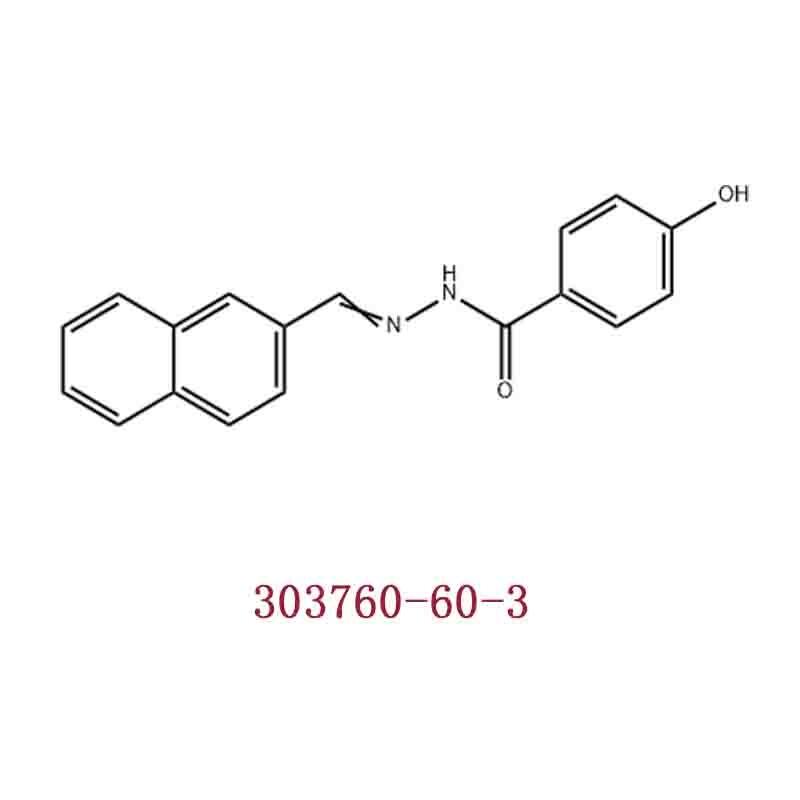-
Categories
-
Pharmaceutical Intermediates
-
Active Pharmaceutical Ingredients
-
Food Additives
- Industrial Coatings
- Agrochemicals
- Dyes and Pigments
- Surfactant
- Flavors and Fragrances
- Chemical Reagents
- Catalyst and Auxiliary
- Natural Products
- Inorganic Chemistry
-
Organic Chemistry
-
Biochemical Engineering
- Analytical Chemistry
-
Cosmetic Ingredient
- Water Treatment Chemical
-
Pharmaceutical Intermediates
Promotion
ECHEMI Mall
Wholesale
Weekly Price
Exhibition
News
-
Trade Service
Only for medical professionals to read and refer to "The new digestion medicine is here", there are new developments in medicines you want to know! Cholangiocarcinoma (cholangiocarcinoma) is one of the most malignant and lethal tumors.
It can be divided into two categories: intrahepatic cholangiocarcinoma and extrahepatic cholangiocarcinoma.
Intrahepatic cholangiocarcinoma (ICC) has the highest incidence and accounts for about liver malignant tumors.
15%~20%
of
Most ICC patients have local invasion or distant metastasis at the first visit and lose the chance of radical surgery
.
The treatment of cholangiocarcinoma is very limited, and traditional chemotherapy regimens have little effect on patients
.
In recent years, the emergence of targeted therapy drugs has brought good news to patients
.
Fibroblast growth factor receptor (FGFR) and neurotrophic myosin receptor kinase (NTRK) have been found to be closely related to the occurrence and development of cholangiocarcinoma, and are expected to become important therapeutic targets
.
This article counts the recent progress of several popular new types of targeted drugs for cholangiocarcinoma
.
01 Ivosidenib: French Servier Company Status: FDA approved, US-listed Ivosidenib (IVO, AG-120) is an oral drug that targets IDH1 mutations developed by French Servier
.
The full name of IDH1 is soluble isocitrate dehydrogenase 1, and the detection rate in cholangiocarcinoma is about 10%~15%, and it is more common in patients with intrahepatic cholangiocarcinoma
.
The results of a phase III clinical study showed that compared with placebo, the IDH1 inhibitor Ivosidenib can reduce the risk of disease progression or death in patients with IDH1 mutant cholangiocarcinoma by 63% [1]
.
Ivosidenib was approved by the FDA in July 2018 for the treatment of IDH1-positive relapsed or refractory acute myeloid leukemia
.
On August 26, 2021, the FDA approved the indication for Ivosidenib (Tibsovo, IVO, AG-120) for the treatment of IDH1 mutation-positive cholangiocarcinoma patients who have received front-line treatment, marking it as the indication for this indication The first systemic treatment plan
.
02 Infigratinib Company: BridgeBio Biopharmaceutical Company of the United States and Helsinn Group Joint Research and Development Status: FDA approved, US listed Infigratinib (Truseltiq) is an innovative oral fibroblast growth factor receptor (Fibroblast growth factor receptor) jointly developed by BridgeBio Biopharmaceutical Company and Helsinn Group growth factor receptors, FGFR) FGFR1-3 is a selective and potent inhibitor
.
The results of the study showed that the objective response rate ORR of Infigratinib for cholangiocarcinoma patients was 23.
1% (95%CI: 16, 32), including 1 complete remission (CR) and 24 partial remission (PR); the best objective response (BOR) ) Is 34.
3%, the disease control rate (DCR) is 84.
3%, and the median duration of response (DOR) is 5.
0 months [2]
.
In May 2021, the FDA approved Infigratinib for the treatment of locally advanced or metastatic cholangiocarcinoma (CCA) patients who have previously received treatment and carry FGFR2 fusion or rearrangement
.
03Pemigatinib: Incyte and Cinda Biosciences joint research and development status: FDA approved, the United States and Japan listed Pemigatinib (Pemazyre) is a potent and selective oral FGFR1-3 inhibitor jointly developed by Incyte and Cinda Bio
.
In 2021, the American Society of Clinical Oncology (ASCO) announced the new survival data of Pemazyre's clinical trial FIGH-202
.
The results of the study showed that patients with cholangiocarcinoma with FGFR2 gene fusion mutations or rearrangement mutations, using Pemazyre to reduce lesions by more than 30%, median progression-free survival (mPFS) was 7 months; median overall survival was 17.
5 months, Compared with the second-line chemotherapy, the overall survival time is only 6 months, which is nearly three times longer; the remission rate is 37% (the remission rate of the second-line chemotherapy is less than 10%) [3]
.
In April 2020, Pemigatinib was the first to be approved by the US FDA for the treatment of locally advanced or metastatic cholangiocarcinoma patients who have been previously treated, have FGFR2 fusion or rearrangement, and cannot be surgically removed
.
In March 2021, the Japanese Ministry of Health, Labour and Welfare (MHLW) approved Pemigatinib for the treatment of cholangiocarcinoma
.
04Gunagratinib Company: China Nuocheng Jianhua Company Status: Phase I/IIa clinical trial Gunagratinib (ICP-192) is a new pan-FGFR inhibitor developed by Nuocheng Jianhua Company, which can effectively and selectively inhibit through covalent binding FGFR activity
.
The clinical study included 30 patients with solid tumors receiving ICP-192 treatment
.
The results showed that among 12 patients with FGF/FGFR gene mutations, ORR was 33.
3%, of which 1 case (8.
3%) was CR, 3 cases (25%) were PR, and DCR was 91.
7%
.
In patients with advanced solid tumors, ICP-192 is safe and well tolerated
.
It has shown anti-tumor activity in a variety of tumor types with FGF/FGFR gene alterations, including cholangiocarcinoma
.
As the treatment time is extended, a better response is expected [3]
.
On June 18, 2021, the FDA announced the grant of Gunagratinib (ICP-192) orphan drug designation, recognizing it as a very promising treatment for cholangiocarcinoma
.
05 Entrectinib Company: Roche, Switzerland Status: FDA approved and listed in the United States and Japan Entrectinib (Rozlytrek) is a pan-targeted drug for neurotrophic myosin receptor kinase (NTRK)
.
In the clinical trial of Entrectinib for the treatment of solid tumors, patients from 10 types of solid tumors were included, including patients with cholangiocarcinoma
.
The results showed that the remission rate of Entrectinib treatment of this part of solid tumor patients reached 54.
5%, of which more than 25% of patients achieved clinical complete remission; the median duration of remission (DoR) was 10.
4 months [4]
.
In June 2019, Entrectinib was successfully listed in Japan
.
In August of the same year, the US FDA approved Entrectinib for the treatment of adult and adolescent cancer patients (including cholangiocarcinoma patients) carrying NTRK gene fusion
.
Conclusion: A new era of targeted therapy for malignant solid tumors such as cholangiocarcinoma has come.
New targeted therapy drugs and immunotherapy drugs continue to emerge, improving the survival of cancer patients
.
However, the reliable treatment options available to patients with cholangiocarcinoma are still extremely limited
.
Currently, a number of clinical studies involving new types of targeted therapy for cholangiocarcinoma are in progress
.
It is foreseeable that the publication of these results will promote the development of the field of cholangiocarcinoma treatment and provide diversified treatment options for cancer patients
.
References: [1]Ivosidenib in IDH1-mutant,chemotherapy-refractory cholangiocarcinoma(ClarIDHy): a multicentre,randomised,double-blind,placebo-controlled,phase 3 study.
Lancet Oncol.
2020 Jun;21(6):796- 807.
[2]Infigratinib(BGJ398)in previously treated patients with advanced or metastatic cholangiocarcinoma with FGFR2 fusions or rearrangements:mature results from a multicentre,open-label,single-arm,phase 2 study.
Lancet Gastroenterol Hepatol.
2021 Aug 3: S2468-1253(21)00196-5.
[3]2021 ASCO Annual Meeting.
https://conferences.
asco.
org/am/program[4]Entrectinib in patients with advanced or metastatic NTRK fusion-positive solid tumours:integrated analysis of three phase 1-2 trials.
Lancet Oncol.
2020 Feb;21(2):271-282.
It can be divided into two categories: intrahepatic cholangiocarcinoma and extrahepatic cholangiocarcinoma.
Intrahepatic cholangiocarcinoma (ICC) has the highest incidence and accounts for about liver malignant tumors.
15%~20%
of
Most ICC patients have local invasion or distant metastasis at the first visit and lose the chance of radical surgery
.
The treatment of cholangiocarcinoma is very limited, and traditional chemotherapy regimens have little effect on patients
.
In recent years, the emergence of targeted therapy drugs has brought good news to patients
.
Fibroblast growth factor receptor (FGFR) and neurotrophic myosin receptor kinase (NTRK) have been found to be closely related to the occurrence and development of cholangiocarcinoma, and are expected to become important therapeutic targets
.
This article counts the recent progress of several popular new types of targeted drugs for cholangiocarcinoma
.
01 Ivosidenib: French Servier Company Status: FDA approved, US-listed Ivosidenib (IVO, AG-120) is an oral drug that targets IDH1 mutations developed by French Servier
.
The full name of IDH1 is soluble isocitrate dehydrogenase 1, and the detection rate in cholangiocarcinoma is about 10%~15%, and it is more common in patients with intrahepatic cholangiocarcinoma
.
The results of a phase III clinical study showed that compared with placebo, the IDH1 inhibitor Ivosidenib can reduce the risk of disease progression or death in patients with IDH1 mutant cholangiocarcinoma by 63% [1]
.
Ivosidenib was approved by the FDA in July 2018 for the treatment of IDH1-positive relapsed or refractory acute myeloid leukemia
.
On August 26, 2021, the FDA approved the indication for Ivosidenib (Tibsovo, IVO, AG-120) for the treatment of IDH1 mutation-positive cholangiocarcinoma patients who have received front-line treatment, marking it as the indication for this indication The first systemic treatment plan
.
02 Infigratinib Company: BridgeBio Biopharmaceutical Company of the United States and Helsinn Group Joint Research and Development Status: FDA approved, US listed Infigratinib (Truseltiq) is an innovative oral fibroblast growth factor receptor (Fibroblast growth factor receptor) jointly developed by BridgeBio Biopharmaceutical Company and Helsinn Group growth factor receptors, FGFR) FGFR1-3 is a selective and potent inhibitor
.
The results of the study showed that the objective response rate ORR of Infigratinib for cholangiocarcinoma patients was 23.
1% (95%CI: 16, 32), including 1 complete remission (CR) and 24 partial remission (PR); the best objective response (BOR) ) Is 34.
3%, the disease control rate (DCR) is 84.
3%, and the median duration of response (DOR) is 5.
0 months [2]
.
In May 2021, the FDA approved Infigratinib for the treatment of locally advanced or metastatic cholangiocarcinoma (CCA) patients who have previously received treatment and carry FGFR2 fusion or rearrangement
.
03Pemigatinib: Incyte and Cinda Biosciences joint research and development status: FDA approved, the United States and Japan listed Pemigatinib (Pemazyre) is a potent and selective oral FGFR1-3 inhibitor jointly developed by Incyte and Cinda Bio
.
In 2021, the American Society of Clinical Oncology (ASCO) announced the new survival data of Pemazyre's clinical trial FIGH-202
.
The results of the study showed that patients with cholangiocarcinoma with FGFR2 gene fusion mutations or rearrangement mutations, using Pemazyre to reduce lesions by more than 30%, median progression-free survival (mPFS) was 7 months; median overall survival was 17.
5 months, Compared with the second-line chemotherapy, the overall survival time is only 6 months, which is nearly three times longer; the remission rate is 37% (the remission rate of the second-line chemotherapy is less than 10%) [3]
.
In April 2020, Pemigatinib was the first to be approved by the US FDA for the treatment of locally advanced or metastatic cholangiocarcinoma patients who have been previously treated, have FGFR2 fusion or rearrangement, and cannot be surgically removed
.
In March 2021, the Japanese Ministry of Health, Labour and Welfare (MHLW) approved Pemigatinib for the treatment of cholangiocarcinoma
.
04Gunagratinib Company: China Nuocheng Jianhua Company Status: Phase I/IIa clinical trial Gunagratinib (ICP-192) is a new pan-FGFR inhibitor developed by Nuocheng Jianhua Company, which can effectively and selectively inhibit through covalent binding FGFR activity
.
The clinical study included 30 patients with solid tumors receiving ICP-192 treatment
.
The results showed that among 12 patients with FGF/FGFR gene mutations, ORR was 33.
3%, of which 1 case (8.
3%) was CR, 3 cases (25%) were PR, and DCR was 91.
7%
.
In patients with advanced solid tumors, ICP-192 is safe and well tolerated
.
It has shown anti-tumor activity in a variety of tumor types with FGF/FGFR gene alterations, including cholangiocarcinoma
.
As the treatment time is extended, a better response is expected [3]
.
On June 18, 2021, the FDA announced the grant of Gunagratinib (ICP-192) orphan drug designation, recognizing it as a very promising treatment for cholangiocarcinoma
.
05 Entrectinib Company: Roche, Switzerland Status: FDA approved and listed in the United States and Japan Entrectinib (Rozlytrek) is a pan-targeted drug for neurotrophic myosin receptor kinase (NTRK)
.
In the clinical trial of Entrectinib for the treatment of solid tumors, patients from 10 types of solid tumors were included, including patients with cholangiocarcinoma
.
The results showed that the remission rate of Entrectinib treatment of this part of solid tumor patients reached 54.
5%, of which more than 25% of patients achieved clinical complete remission; the median duration of remission (DoR) was 10.
4 months [4]
.
In June 2019, Entrectinib was successfully listed in Japan
.
In August of the same year, the US FDA approved Entrectinib for the treatment of adult and adolescent cancer patients (including cholangiocarcinoma patients) carrying NTRK gene fusion
.
Conclusion: A new era of targeted therapy for malignant solid tumors such as cholangiocarcinoma has come.
New targeted therapy drugs and immunotherapy drugs continue to emerge, improving the survival of cancer patients
.
However, the reliable treatment options available to patients with cholangiocarcinoma are still extremely limited
.
Currently, a number of clinical studies involving new types of targeted therapy for cholangiocarcinoma are in progress
.
It is foreseeable that the publication of these results will promote the development of the field of cholangiocarcinoma treatment and provide diversified treatment options for cancer patients
.
References: [1]Ivosidenib in IDH1-mutant,chemotherapy-refractory cholangiocarcinoma(ClarIDHy): a multicentre,randomised,double-blind,placebo-controlled,phase 3 study.
Lancet Oncol.
2020 Jun;21(6):796- 807.
[2]Infigratinib(BGJ398)in previously treated patients with advanced or metastatic cholangiocarcinoma with FGFR2 fusions or rearrangements:mature results from a multicentre,open-label,single-arm,phase 2 study.
Lancet Gastroenterol Hepatol.
2021 Aug 3: S2468-1253(21)00196-5.
[3]2021 ASCO Annual Meeting.
https://conferences.
asco.
org/am/program[4]Entrectinib in patients with advanced or metastatic NTRK fusion-positive solid tumours:integrated analysis of three phase 1-2 trials.
Lancet Oncol.
2020 Feb;21(2):271-282.







